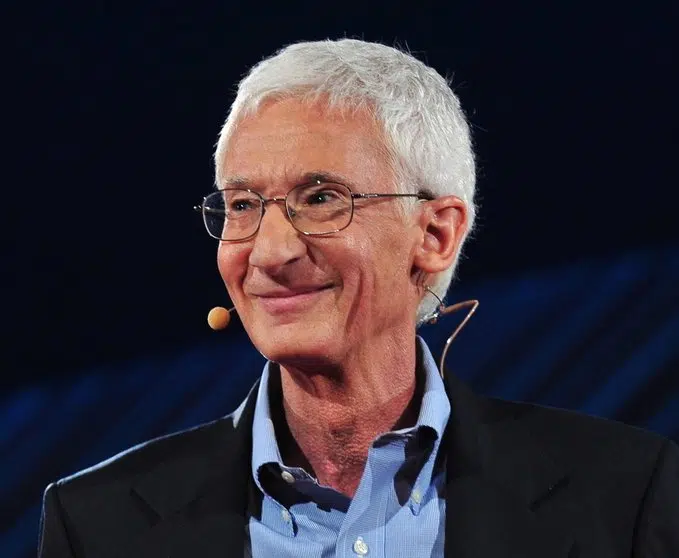
Prof. Roland Griffiths
Copyright: Johns Hopkins University
Highest Accolade for a pioneer in modern psychedelic research: Roland Griffiths receives the MIND Award
The MIND Award for exceptional contributions to psychedelic research and therapy was given to Roland Griffiths during the Symposium “Metamorphose der Psychiatrie? Psychedelika in der Medizin 2022” last weekend. Over the course of the past two decades, Griffiths heralded the “Psychedelic Renaissance” with his research conducted at John Hopkins University.
Heidelberg, September 12th, 2022. In recognition of his lifetime achievements, Roland Griffiths of Johns Hopkins University received the highest accolade awarded by the MIND Foundation: the MIND Award. The award is endowed 4,000 euros. For reasons of health, the recipient was unable attend the award ceremony in person. The recipient of the MIND Award is determined by the organization’s Scientific Advisory Board. This multidisciplinary committee of experts from all over the world selects one person whose lifetime achievements have contributed to the advancement of psychedelic research. Qualified for this selection are brilliant and influential theoretical publications as well as groundbreaking empirical discoveries in basic or clinical research such as those published by Prof. Dr. Roland Griffiths. In cooperation with the MIND Foundation, the Central Institute for Mental Health in Mannheim and Charité University Medicine in Berlin currently conduct one of the largest clinical trials to treat depression with psilocybin, the EPIsoDE study.
On occasion of the award ceremony, Dr. sc. hum. Henrik Jungaberle (Executive Director of the MIND Foundation), Dr. Martha Nari Havenith (current chair of MIND’s Scientific Advisory Board and Max-Planck research group leader at the Ernst-Strüngmann-Institute for Neurosciences), as well as Prof. Dr. med. Gerhard Gründer (head of department for molecular neuroimaging at the CIMH in Mannheim).
Statements:
Dr. Henrik Jungaberle: „Innovation and progress in research and therapy are only possible if humans dare be courageous – and Roland Griffiths is one of those daring pioneers. After many years of taboo, he succeeded to lift psilocybin from the murky depths of an illegal drugs image and studied the therapeutic potential of this substance belonging to the class of ‘psychedelics’. He initiated what we call the psychedelic renaissance. We are convinced that this renaissance in psychiatry and psychotherapy will lead to new therapies. Roland Griffiths built the foundation for it.”
Dr. Martha Nari Havenith: “For decades, Roland Griffiths’ scientific work has been groundbreaking in enabling rigorous scientific access to phenomena and effects of mind-altering substances that are hard to grasp. His studies do not only serve as a knowledge base for future research in the field, but also as a role model for courageous and principled scientific practice. The 25 members of the MIND Foundation’s Scientific Advisory Board unanimously voted for Roland Griffiths to receive the award.”
Prof. Dr. Gerhard Gründer: “We congratulate Roland Griffiths for the reception of the MIND Award in recognition of exceptional scientific contributions – after many years of stasis and stigmatization of psychedelic research, we are proud to proceed in carrying the torch in Germany by means of our study on psilocybin-assisted treatment. Two years ago, the Central Institute for Mental Health took the leading role in the EPIsoDE study, one of the world’s largest trials in the psilocybin-assisted treatment of patients with depression; psilocybin being the active compound in the so-called ‘magic mushrooms’. Roland Griffiths has paved the way for this research. For that we thank him.
About the recipient Roland Griffiths
Roland Griffiths is a professor in the department of psychiatry and neurosciences at the medical faculty of Johns Hopkins University and founding director of the Johns Hopkins Center for Psychedelic and Consciousness Research. His research focuses on clinical as well as preclinical work in the investigation of behavior and the subjective effects of mind-altering drugs. He has conducted numerous studies with sedatives, hypnotics, caffeine, and new mind-altering drugs.
In 1999, he initiated a research program to investigate the effects of the classical psychedelic psilocybin, comprising studies with healthy volunteers, beginner and long-time meditators, and religious leaders. Therapeutic studies with psilocybin concerned the treatment of mental stress in cancer patients, in smoking cessations, and in major depression. Other studies have examined the effects of Salvinorin A, dextromethorphan, and ketamine which produce altered states of consciousness with some similarities to psilocybin.
A wider audience in the USA and in Europe got to know Roland Griffiths through the Netflix series “How to Change Your Mind”, based on the eponymous book by Michael Pollan. The second of four episodes deals with the substance psilocybin and pays due diligence to the research by Roland Griffiths.




